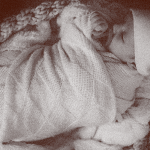The whole high school felt the electric bass and guitar’s metallic reverb ripple over their skin, the pulse of the snare drum. The students drifted through soupy fog toward the echo of warbling, apparently coming from the outside cafeteria in the middle of campus. The crowd wondered what was going on. They gazed at the band of three boys on a tiny stage set up over a patch of brown winter grass. The band members’ hair glistened with gel. Their new dark jeans were rolled up in wide cuffs. And their red cowboy shirts were embossed with black musical notes up the sleeves. The crowd wore corduroys, bulky vest jackets, T-shirts with emblems of their favorite band across their chests.
On the bass drum, chunky letters from a black marker let the crowd know that they were The Loners.
Finally, the first lunch concert of Fall, a group of sophomore girls thought standing on a cafeteria table. The crowd packed closer in, devouring burritos, nachos, chicken fingers. They cheered and booed. No one recognized the band members. They must’ve ditched their own high school, a group of freshman boys thought as they tightroped across a high cinder block wall near the math building. Others thought, If I got up the guts to perform during a school’s lunch time, I’d find a place I didn’t know anyone, either. One senior jock thought, It’s 1950s shit. One junior student council member thought, It’s called rockabilly. My brother listens to it. When the bassist sang a slow song about a lover appearing in his dreams, she and her friends squealed.
A rowdy section in the crowd threw plastic cups filled with chocolate milkshakes. The drummer sped up the tempo and closed his eyes. The guitarist stepped onto the dead grass and continued strumming. The bassist dodged the incoming and sang the best he could.
Far outside the crowd, a lone sophomore girl sat on the sidewalk below the lockers attached to the art building, her frayed trench coat from the army surplus store downtown wrapped around her thin body. She nibbled on her ham and cheese sandwich out of a brown paper bag. Then she used the heel of her hand to rub her eyes. He sings like a wounded bird, she thought. He knows how it feels.
The sophomore thought about others who didn’t seem to feel wounds, how they can split like fissures. The sophomore’s mom harped, Why do you dress like a homeless person? Don’t you care about being ugly? Her dad complained, Someone your age should have a lot of friends. I don’t want a freak for a daughter. And her older sister ragged, Stop snorting through your nose when you eat. God, you spaz. Others didn’t care how wounds widened to the size of a canyon, leaving her trapped in the center of an entrenched river. They didn’t care how she floundered against a strong current, her head barely above water.
Another fast song started up, and the bass sounded like it hiked up a steep trail. The sophomore rocked back and forth her tattered boots. She mused, He knows like I know like he knows. Rubbing her eyes once more, she ate the rest of her sandwich with a gusto she seldom let others see.
…
Biography: Dan Crawley is the author of Straight Down the Road (Ad Hoc Fiction, 2019) and The Wind, It Swirls (Cowboy Jamboree Press, 2021). His writing appears or is forthcoming in Jellyfish Review, Lost Balloon, JMWW, Milk Candy Review, Atticus Review, and elsewhere. Find him at https://twitter.com/danbillyc.
…
Image: unsplash.com





